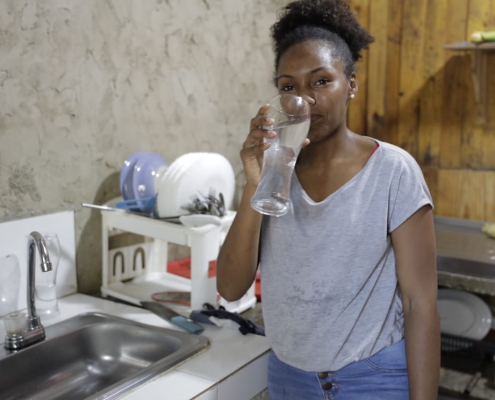ACTIVE PROGRAMS IN 2021

The following three programmes remain active in 2021:
The Investment Plan “Todos por el Pacífico” – Chocó, Antioquia, Cauca, Nariño (COL-018-B), which aims to improve water and sanitation services in 10 municipalities and one population centre in Chocó, an area of great complexity. This programme has been running since 2011 and has accumulated some delays in recent years due to low implementation levels. As of September 2021, the works on the projects still to be carried out (Novita, Medio Baudó and Istmina) are at a standstill and the execution deadline had to be extended to September 2022. Of the remaining planned interventions, those in Atrato, Bahía Solano, Tadó, Acandí, Capurganá and Río Quito have been carried out.
The objective of the Comprehensive Pacific Multi-Veredal Project (COL-022-B) is to construct a water and sanitation system in the town of Espriella, which will benefit 2,300 people, as well as to support the design and viability of the Multi-Vedal Aqueduct, which would serve other towns in the area (Guayacana, Caunapí, Llorente and Espriella). This programme is implemented in the municipality of Tumaco (Nariño), a priority area for Spanish Cooperation in Colombia, and the beneficiary of the grant is the Government of Nariño. The complex social context and the programme’s own weaknesses have delayed implementation. An extension has been granted in 2021, subject to the concessionary entity obtaining the land for the construction of the water system in Espriella and to the achievement of the financial viability of the project and all the administrative documentation that allows the publication of the bidding processes for the works. The new estimated completion date for the works is 31st May 2023.
Finally, the Rural Water Supply and Wastewater Management Programme (COL-035-B) aims to contribute to increasing the coverage of drinking water and sanitation services in the rural communities of Fonseca (in La Guajira), San Onofre (in Sucre) and Totoró (in Cauca). This programme has accumulated long delays in implementation due to the approval of the technical designs of the works, as well as economic, administrative and organisational problems experienced by the executing agency. Due to these difficulties, in April 2021 a decision was made to reduce the scope of the programme to the San Onofre and Fonseca projects only, with a partial repayment of funds. The new deadline for the completion of the programme is November 2023.
OTHER WATER AND SANITATION PROGRAMMES ASSOCIATED WITH THE FUND
In 2021, Colombia has also carried out the Methodological Proposal to Identify the Population in a State of Social Vulnerability, to Make Them Beneficiaries of the Minimum Vital Water Subsidy in Bogotá D.C. (COL-SECT-037). This programme has bilateral funding from the AECID (with a donation of 96,000 euros) and arises from the synergies fostered by the Water Fund. The objective is to improve the distribution of subsidies offered by the Mayor’s Office of Bogotá in order to guarantee the minimum vital water supply in the city. The results of this programme are far-reaching because they have a significant impact on guaranteeing the human right to water for the city’s most vulnerable population (approximately 800,000 beneficiaries) and because the working methodology can be easily transferred to other cities and become a reference point. Its implementation ended in October 2021 and its dissemination and socialisation will be carried out throughout 2022.
COUNTRY CONTEXT
Colombia is considered a “partnership country”, and the presence of Spanish Development Cooperation responds to the years of conflict that the country has been experiencing and to which it is committed to overcoming.
Since its inception, the Fund has implemented nine programmes in Colombia, amounting to a total donation of 59 million euros. Most of the water and sanitation actions have focused on areas of displacement due to the conflict in the country, such as Chocó and Nariño, areas where displaced populations have settled (mainly on the outskirts of Cartagena de Indias), and rural areas and indigenous communities in the Sierra Nevada de Santa Marta, Guajira, Sucre and Cauca

